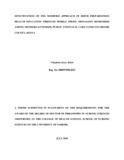| dc.contributor.author | Cheptum, Joyce J | |
| dc.date.accessioned | 2018-10-25T08:45:18Z | |
| dc.date.available | 2018-10-25T08:45:18Z | |
| dc.date.issued | 2018 | |
| dc.identifier.uri | http://hdl.handle.net/11295/104415 | |
| dc.description.abstract | Background: Various approaches have been established to address maternal mortality, which is a major problem in developing countries. Birth preparedness (BP) is one approach that has been found to effectively prevent obstetric delays that eventually contribute to lower mortalities. However, little is understood about the birth preparedness health education methods. This study aimed at assessing effectiveness of the modified approach of birth preparedness health education through mobile phone messaging reminders among mothers attending public antenatal care clinics in Migori County, Nyanza region of Kenya.
Methodology: This was an interventional study carried out in two phases. The baseline was a cross-sectional descriptive study, which utilized mixed methods. Quantitative data was collected through an interviewer-administered questionnaire while qualitative data was collected using focus group discussions (FGDs) from the mothers. The study population comprised of pregnant women in their first and second trimester attending public health facilities in Migori County. Multistage sampling method was used to select the sub-Counties and stratified sampling was used to select the health facilities. The sample size comprised of 401 participants. Four FGDs were conducted, one in each selected facility where pregnant women were randomly selected to participate. Research assistants collected data using an interviewer - administered questionnaire, while the principal investigator conducted the FGDs. Descriptive statistics were reported and regression analysis was done to test the level of significance which was p<0.05. Data obtained was presented in forms of figures and tables. Respondents for the second phase were recruited and followed up in the control and intervention groups. A mobile phone text message was sent to those in the intervention group of the study and the birth preparation was compared for the two groups at the end of the study.
Results: Most of the study participants (73%) were aged between 20-34 years. Majority of the respondents were married (79.2%) and most of them had primary level of education. Protestant was the predominant religion (55.2%). Housewives and businesswomen constituted 34.2% and 27% respectively. Most of the respondents (61.5%) resided in the rural areas. Only 47% of the respondents were knowledgeable on birth preparedness at baseline. The factors which affected knowledge on BP were marital status (p=0.003), residence, unemployment and the partner’s level of education (p=0.001). Those who had favourable practices of birth preparedness were 56%. Health education on BP was provided to 92.6% of the respondents mostly during the first visit. Group teaching was more utilized (61.5%) in the baseline survey. Individualized teaching was utilized in the intervention group (71.2%). Documentation of the BP messages was done in 24.1% of the respondents at baseline survey. The reported challenges experienced during the teaching sessions included language barrier, unfriendly staff and poor timing of the messages. Most of the respondents (74.3%) in the intervention group had made birth preparations as compared to those in the control group (48.1%).
Conclusion: Use of mobile phone text message was effective in enhancing birth preparedness as compared to using verbal messages only.
Recommendations: Effort need to be made to enhance birth preparedness health education through use of mobile phone text message. | en_US |
| dc.language.iso | en | en_US |
| dc.publisher | University of Nairobi | en_US |
| dc.title | Effectiveness of the modified approach of birth preparedness health education through mobile phone messaging reminders among mothers attending public antenatal care clinics in Migori county, Kenya | en_US |
| dc.type | Thesis | en_US |
| dc.description.department | a
Department of Psychiatry, University of Nairobi, ; bDepartment of Mental Health, School of Medicine,
Moi University, Eldoret, Kenya | |

